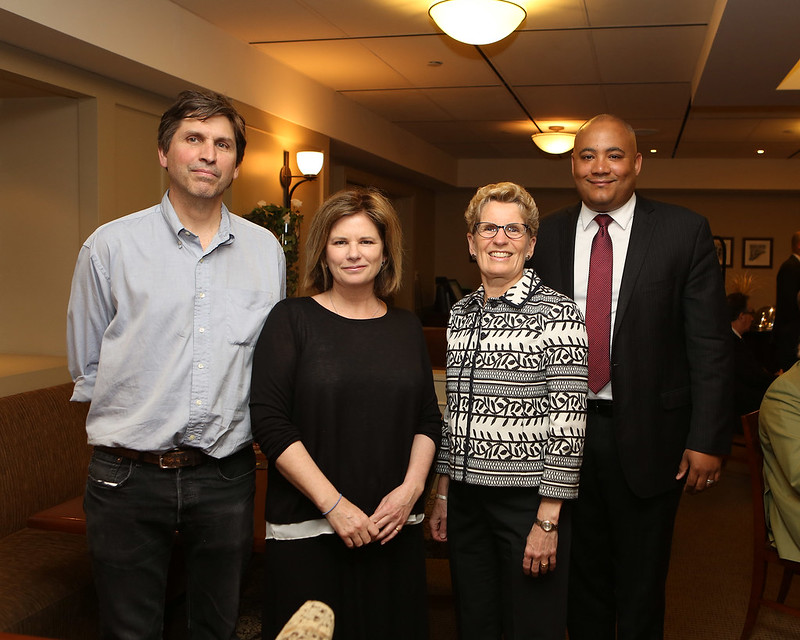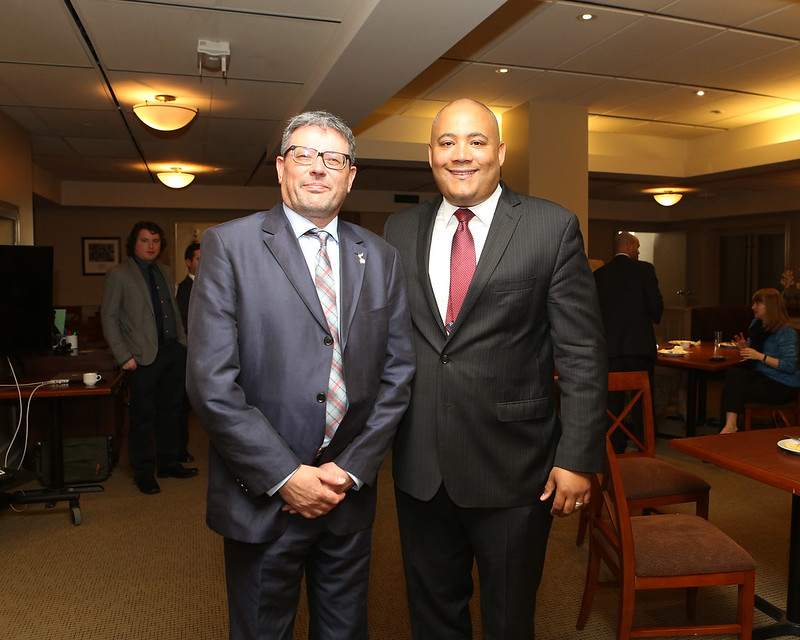Yesterday in St. Catharines, MusiCounts held a Band-Aid Celebration event at the DSBN Academy, which featured a special performance by three-time JUNO Award winners The Sheepdogs. The event was celebrating the $30,000 raised for MusiCounts through Hockey Night in St. Catharines 2014, supported by Music Canada and Partridge Wealth Management. DSBN Academy was one of three Niagara-area schools to receive $10,000 worth of instruments through MusiCounts’ Band-Aid Grant program, which has granted $595,000 worth of in musical instruments to 69 schools across Canada this year.
Local MP and Parliamentary Secretary to the Minister of Heritage Rick Dykstra is the organizer of Hockey Night in St. Catharines, and was on hand to speak to the importance of music education and the impact that music can have in a community.
“Every year I have been amazed at the success of Hockey Night in St. Catharines and through United Way of St. Catharines and District, how we have been able to help fund vital programs for the disadvantaged in our community. But what is happening here today is pure magic,” said Dykstra. “Getting instruments into the hands of young people and giving them the gift of music is something that will enrich them all of their lives. I cannot thank MusiCounts, Music Canada and Partridge Wealth Management enough for helping all of this come together and I especially want to thank Ewan and Shamus Currie of The Sheepdogs for taking time out of their schedules to be with us on this very special day.”
During their performance, The Sheepdogs’ Ewan and Shamus Currie spoke of their own experience with music education growing up, and offered some advice to students at DBSN.
“Obviously music is a great opportunity, whether it’s a job or just a really awesome pastime or hobby,” said Ewan in an interview with Cogeco News. “I just want them to realize that maybe it seems difficult and a bit structured at first when you’re learning scales, and starting off with the basic building blocks, but it’s really a pathway that leads you to a lot of enjoyment and a really cool way to spend your time.”
Music Canada and our members Sony Music Entertainment Canada, Universal Music Canada, and Warner Music Canada are proud supporters of the Band Aid Grant program. This is the third year of Music Canada’s partnership with MusiCounts, following a 2012 pledge of $250,000 over the next three years, which supports music education programs in schools in across the country.
Music education is a key priority of Music Canada as one of our five strategies in The Next Big Bang report, which recommends that given the strong evidence that music education prepares workers who are more creative, better problem-solvers, and possess soft skills that are critical in the digital economy, as well as the correlation between music scenes and tech clusters, governments should invest more in music education and should consider music scenes as a tool for economic development.
For more on the event, see coverage from TV Cogeco Niagara, Newstalk 610’s Larry Fedoruk Show, and the St. Catharines Standard, and the social media highlights below.
What a wonderful performance by the junior students at @dsbn Academy! #MusiCounts pic.twitter.com/c3PO6a3X6d
— MusiCounts (@MusiCounts) May 21, 2015
“With this grant, we can produce the opportunity to learn the beautiful language of music” says DSBN’s Isaac Hannigan pic.twitter.com/zBe0F7YwPK
— Music Canada (@Music_Canada) May 21, 2015
Local MP & Parl. Secretary to Min of @CDNHeritage @RickDykstra speaks at @Musicounts Band Aid Celebration at DSBN: pic.twitter.com/jCOL193KKt
— Music Canada (@Music_Canada) May 21, 2015
“Music is a fabulous way to not just enjoy our culture, but also to grow up and learn.” – @RickDykstra
— Music Canada (@Music_Canada) May 21, 2015
@TheSheepdogs perform for the crowd. Best live performance at DSBN Academy. Thank you @MusiCounts pic.twitter.com/jBISp5W1Gk
— DSBNAcademy (@DSBNAcademy) May 21, 2015
#thesheepdogs performing live at @DSBNAcademy.Thx @RickDykstra for raising funds through @HNISC @MusiCounts @uwaysc pic.twitter.com/DYnHTMI8Nv
— Marcus Butters (@marcnasty5) May 21, 2015
. @TheSheepdogs talk about about their experience with music and perform for @DSBNAcademy (@dsbn). #MusiCounts pic.twitter.com/j7BTJI07zq
— MusiCounts (@MusiCounts) May 21, 2015
@RickDykstra at @DSBNAcademy shares his passion for providing music to all in Niagara. @MusiCounts pic.twitter.com/6Fm37PsQP1
— United Way (@uwaysc) May 21, 2015
@MusiCounts and @TheSheepdogs reveals DSBN Academy with our new instruments pic.twitter.com/R4C4r3mxg2
— DSBNAcademy (@DSBNAcademy) May 21, 2015
Unvealed this morning at DSBN Academy. New band instruments 4 the school! @musiCounts @music_Canada & @thesheepdogs pic.twitter.com/CeeEhhLAl6
— Rick Dykstra (@RickDykstra) May 21, 2015




Music Canada